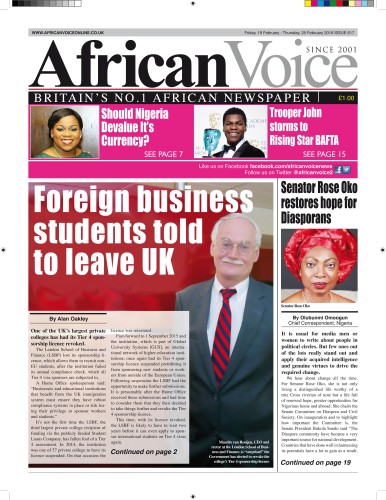With the steady depreciation of Nigeria’s currency in the last few weeks, many have expressed concern for Africa’s largest economy, should this be the right time to devalue the naira?
Does the high exchange rate against the dollar and pounds benefit anyone or is this a means to increase inflow of remittances in the face of dwindling oil revenue?
While, the International Monetary Fund (IMF) and the former CBN governor now Emir of Kano, Muhammad Sanusi II, and many other economists favour the devaluation of the naira, in this opinion piece for African Voice, ‘Ronke Adeagbo, a Chartered Accountant and former President of Institute of Chartered Accountants of Nigeria (ICAN) UK chapter expresses a different perspective.
With the Naira falling over 50% in the last one year alone, there are no prizes for guessing that the Naira is in trouble. But is devaluation the silver bullet?
The exchange rate is not set by government or banks. It is set by the laws of demand and supply, just like any other commodity. Although it can be influenced by government policies.
Oil revenues, being the cash cow of the Nigerian economy is at its lowest in the last two decades, therefore acute dollar supply. But the demand for dollar has not changed. So in line with the elasticity rules, when you have more Naira chasing few Dollars, it triggers a default devaluation of the Naira.
We need to aim to boost exports, reduce our dependency on oil and imports, increase access to credit to stimulate the economy and attract Foreign Direct Investment to help redress the infrastructural deficit.
Nigeria spends a lot on importing refined petroleum products. It is not rocket science, we simply need to revive our refineries to reduce our demand for the dollar to buy back these refined petroleum products and create jobs and increase retained earnings in the process.
The current exchange rate benefits Nigerians in diaspora, as their hard-earned money will get them more Naira. But with a potential inflation in the horizon in Nigeria, that extra value, could soon disappear. But an influx of diaspora remittances, in my view is a ‘low-hanging’ solution. Essentially, our remittances needs to be the ‘new oil’.
With the current forex crisis, Diasporas remittances becomes very important. We are increasingly become part of the solution. This has been demonstrated in other economies such as India etc. We need to rise up to the challenge and help save our Naira. Send more money home and ensure this is used for more capital-oriented projects to create jobs and encourage your folks to spend those remittances locally. We also, need to encourage the government to ensure Diasporas’ are well represented at the decision-making table and the diaspora commission becomes a reality.
With the implementation of some of the above strategies, the Naira would find its level, hopefully a favourable and sustainable one. Whilst I appreciate that a cheaper currency will discourage imports and by default reduce demand for dollar, encourage exports and influx of dollar and sustain jobs created by the exports, encourage more influx of diaspora remittances and FDI. However, the painful aspect is that if we devalue, it would become too expensive to buy some necessary imports such as refined petroleum products, wheat etc. and inflation could be triggered. But in my opinion, this pain may be a ‘nice problem’, as it will encourage us to look for local substitute. Nigeria cannot cut demand for forex without some draconian and comprehensive approach that encourages ‘produce-and-buy Nigeria’.
The Naira must be allowed to find it’s level…… so let it float.
Mrs ‘Ronke Adeagbo is a Chartered Accountant and Treasurer of Central Association of Nigerians in the UK (CANUK)












We need not devalue the naira. Let us produce more products other than crude oil for export to increase our foreign reserves on the long run. With our potentials, our internally generated revenue is low because of impunity and corruption tendencies’. We need to invest massively in these sectors; agriculture, mining, bitumen, transportation and energy. The primus inter pare battle is to fight CORRUPTION in out systems. It is a pervasive phenomenon. On a final note, are the USERs of foreign currency sincere. The journey ahead will be tough and require tough decisions and action. Time will tell.
Comments are closed.